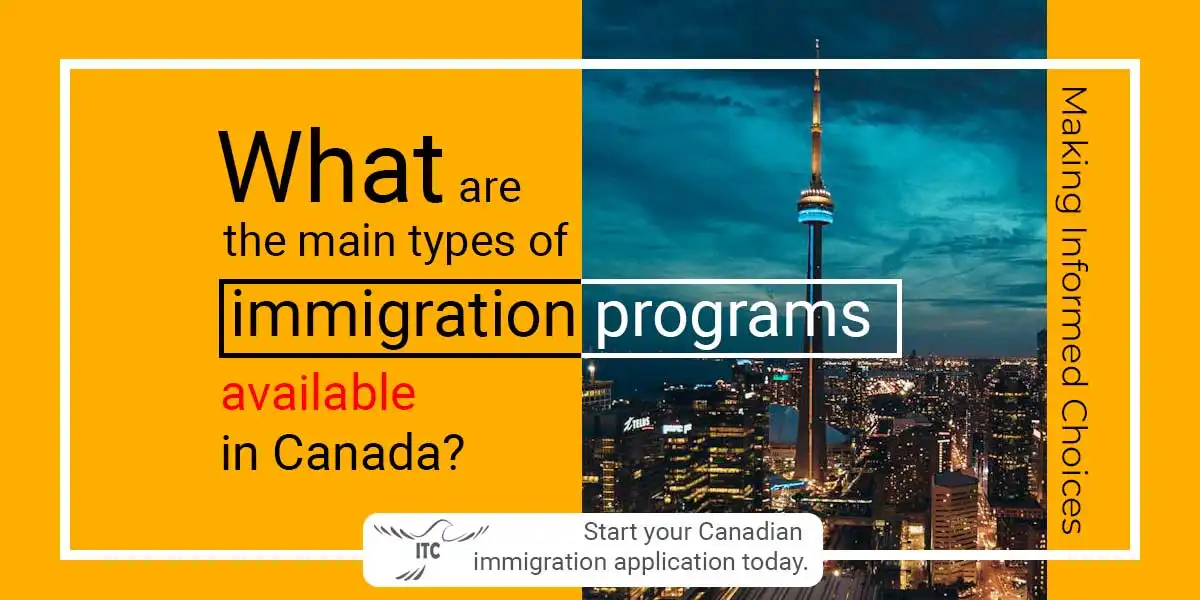Canada is renowned for its welcoming stance towards immigrants and offers various immigration programs to cater to a diverse range of needs and qualifications. Understanding the types of immigration programs available in Canada is crucial for anyone considering making Canada their new home. This blog post explores the different programs, their unique features, and additional insights to assist potential immigrants in navigating the Canadian immigration landscape.
1- Express Entry System
The Express Entry System is a flagship program of Canadian immigration. It's designed for skilled workers who wish to become permanent residents. This system evaluates candidates based on factors like age, education, work experience, and language proficiency in English or French. The higher the score, the better the chances of receiving an invitation to apply for permanent residence. The Express Entry system encompasses three main federal immigration programs:
Federal Skilled Worker Program (FSWP): For skilled professionals with foreign work experience.
Federal Skilled Trades Program (FSTP): Aimed at qualified tradespeople in occupations like carpentry, plumbing, electrical work, etc.
Canadian Experience Class (CEC): For those with Canadian work experience, typically gained through work permits or while studying in Canada.
2- Provincial Nominee Programs (PNPs)
Provincial Nominee Programs allow Canadian provinces and territories to nominate individuals who wish to immigrate to Canada and who are interested in settling in a particular province. Each PNP has its criteria, targeting specific groups such as students, business people, skilled workers, or semi-skilled workers. Notable PNPs include:
- Ontario Immigrant Nominee Program (OINP)
- British Columbia Provincial Nominee Program (BC PNP)
- Alberta Immigrant Nominee Program (AINP)
These programs often result in faster processing times compared to other immigration streams.
3- Family Sponsorship
Family Sponsorship programs enable Canadian citizens and permanent residents to sponsor their relatives, including spouses, common-law partners, dependent children, parents, and grandparents, for Canadian immigration. This program is fundamental in promoting family reunification in Canada.
4- Business Immigration
This category is designed for individuals who have the ability to contribute to Canada’s economy through their investment and business acumen. There are two main types:
Start-Up Visa Program: Targets innovative entrepreneurs with a business idea supported by a designated organization in Canada.
Self-Employed Persons Program: For individuals with relevant experience in cultural activities, athletics, or farm management, intending to be self-employed in Canada.
5- Canadian Experience Class (CEC)
Part of the Express Entry system, the CEC is tailored for those who have already gained skilled work experience in Canada. This program is an excellent pathway for temporary workers or international students to transition to permanent residence.
6- Humanitarian and Compassionate Grounds
This program is for people who are already in Canada and do not qualify for other immigration programs. Applicants can apply on humanitarian and compassionate grounds if they have exceptional cases (like family ties or established life in Canada) that would cause undue hardship if they were to leave the country
7- Refugee and Asylum Programs
Canada offers protection to those who face persecution in their home countries. The refugee program is for individuals outside of their home country or the country they normally live in and are unable to return because of that fear of persecution. Asylum seekers can make their claim at a port of entry or at an immigration office within Canada.
Additional Considerations and Tips
Language Proficiency: For most programs, proficiency in English or French is essential. Preparing for and taking language proficiency tests like IELTS or TEF is often a critical step in the immigration process.
Education Credential Assessment (ECA): For educated immigrants, getting your foreign education assessed against Canadian standards can significantly improve your chances of success, especially under the Express Entry system.
Job Offers: While not mandatory for all programs, having a valid job offer from a Canadian employer can boost your application, especially in PNPs.
Legal and Consultation Services: Navigating the immigration process can be complex. Seeking assistance from certified immigration consultants or lawyers might be beneficial.
Settlement Services: Once in Canada, there are numerous settlement services available to help immigrants integrate into Canadian society. These include language training, employment services, and community support.
Stay Informed: Immigration policies can change. Stay updated with the latest information from reliable sources like the Government of Canada's official website or authorized immigration consultants.
Conclusion
Canada's immigration programs are diverse, catering to a wide array of backgrounds, skills, and needs. Whether you are a skilled worker, an entrepreneur, have family in Canada, or are seeking refuge, there is likely a pathway for you. Understanding these programs, their requirements, and how they align with your circumstances is the first step towards a successful immigration journey to Canada. Remember, each immigration journey is unique, and thorough research, preparation, and sometimes professional guidance are key to navigating the process effectively.
Do you want to have detailed updated information about your visa file?
You can apply for GCMS Report to recieve detailed information about your file; and/or Recieve copy of your file is in process in the IRCC
To find out if you’re eligible for immigration to Canada, simply complete our free assessment! A member of the ITC Immigration Team will review your eligibility and contact you to discuss your options!
Do you want to have detailed updated information about your visa file?
You can apply for GCMS Report to recieve detailed information about your file; and/or Recieve copy of your file is in process in the IRCC



